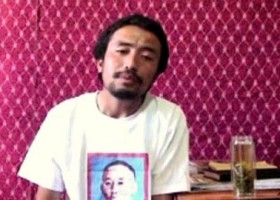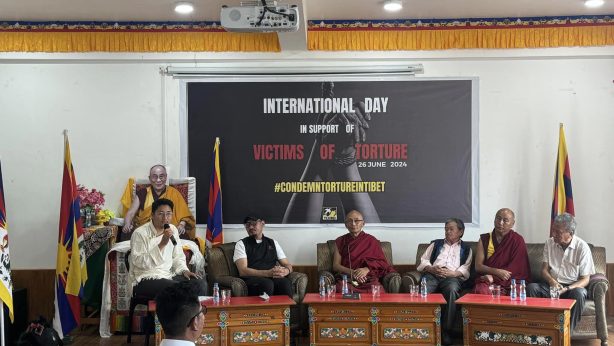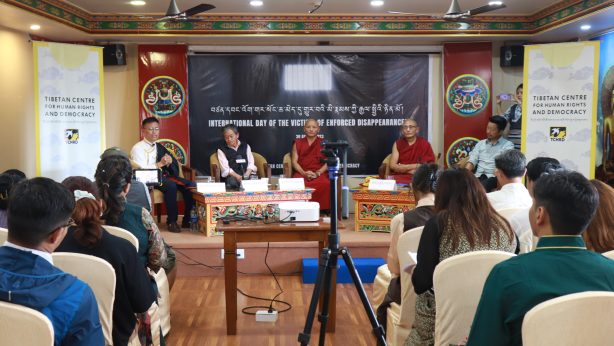Tibetan activist writer released after four years in prison
“I hate lies and intrigues. The purpose of my life is to secure truth and justice”
– Gyitsang Takmig
![Activist writer Gyitsang Takmig in his prison uniform in an undated photo. [Credit: Tibet Times]](https://tchrd.org/wp-content/uploads/2014/10/Takmig-pic-300x209.jpg)
Tibetan Centre for Human Rights and Democracy (TCHRD) welcomes the release of Tibetan activist writer Kelsang Tsultrim aka Gyitsang Takmig who was unjustly sentenced to four years in prison for engaging in ‘separatist’ activities in 2011.
TCHRD believes that the activist writer was punished for his peaceful resistance to destructive Chinese policies. His prison sentence represents yet another attempt at silencing individual Tibetans who speak truth to power and demand accountability from the Chinese government over its policy failure in Tibet.
Kelsang Tsultrim, 34, was released on 3 October 2014 after completing his sentence from Da Sha Ping(大砂坪) Prison located in Lanzhou (capital of Gansu Province), reported the Tibet Times, an India-based Tibetan language newspaper.
The activist writer was incarcerated for recording his testimony on a video CD and then distributing 2500 copies of the VCD among Tibetans living in Tibetan areas in Gansu, Sichuan and Qinghai provinces.
The hour-long video testimony entitled “Lack of Freedom in Tibet” gave an account of Tibetan history since the flight of the Dalai Lama into exile, lack of basic human rights in Tibet, and the struggle, hope and aspiration of Tibetan people for freedom. In the video, Kelsang Tsultrim condemns, among others, displacement of Tibetan nomads, rampant mining, environmental destruction, economic marginalization and social exclusion of the Tibetan people. “So many Tibetans have sacrificed their lives to protest Chinese rule over the past year, including myself here today, because we want equal rights and freedom. We will never give up our fight for freedom and truth until Chinese policies change regarding the implementation of the Constitution,” he concluded in the video.

Kelsang Tsultrim was arrested for the first time on the night of 27 July 2007 in Dzoege (Ch: Ru’ergai) County in Ngaba (Ch: Aba) Tibetan Autonomous Prefecture, Sichuan Province. He had been charged of “committing political error”but was released.
Three years later on 13 December 2010, he was arrested again. This time he was detained incommunicado for a year at a PSB detention center in Tsoe (Ch: Hezuo) city in Kanlho (Ch: Gannan) Tibetan Autonomous Prefecture (TAP), Gansu Province. His family came to know about his arrest on 30 December 2011, when Public Security Bureau officers from Kanlho TAP informed his father that he had been sentenced to four years in prison for “colluding with foreign separatist forces to split the Chinese nation.”
Kelsang Tsultrim is a native of Gyitsang Mang Wanglung Village, Sangchu (Ch: Xiahe) County located in Kanlho TAP. He was born in 1980 to father Samphel and mother Kyi Ri. He attended a local school learning Tibetan and Chinese languages until he was nine. At the age of 13, he joined the local Gaden Chokhorling Monastery, where he studied Tibetan literature and Buddhist philosophy. In 2005, he joined another Buddhist institute in Sangchu County from where he graduated four years later in 2009.
TCHRD urges the Chinese authorities to ensure that Kelsang Tsultrim gets prompt medical attention for any health complication he may have developed during his incarceration. The Chinese government must should ensure that he gets to lead a normal life without frequent questioning and harassment from local authorities, and that his dignity and rights are respected.
Kelsang Tsulrim’s arrest, torture and imprisonment are in grave violation of the fundamental rights and freedoms enshrined in the international human rights law, and the Chinese Constitution, which protects and guarantee basic right to free expression and peaceful dissent. Article 35 of the Chinese constitution provides the right to “freedom of speech, of the press, of assembly, of association, of procession and of demonstration.”
In his video appeal, Kelsang Tsutrim had called on the Chinese authorities to honour their own words of upholding and respecting the rule of law, the constitution and the rights of the Tibetan people:
We do not hate the Chinese, but we respect truth and justice. We were protesting against Chinese rule because the local authorities are not acting according to China’s Constitution and autonomy laws. The Premier of the People’s Republic of China said that China respects truth and justice. But Tibetans don’t have equal religious, political, and economic rights.


